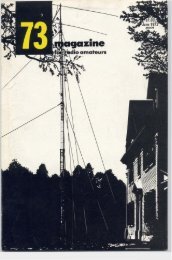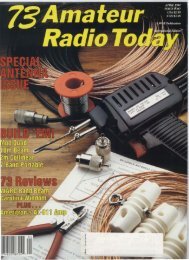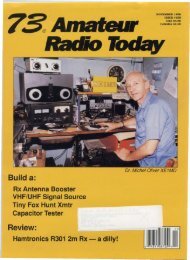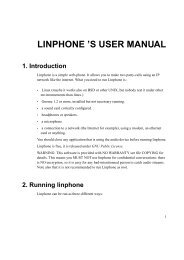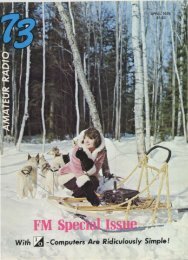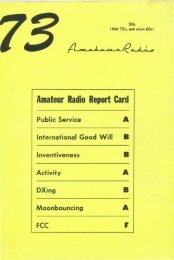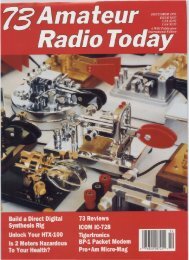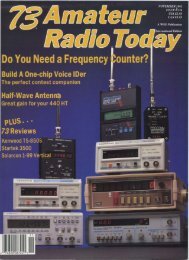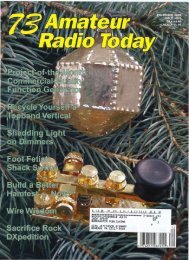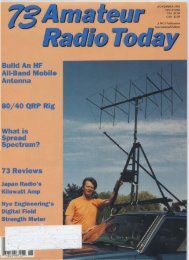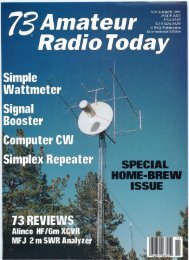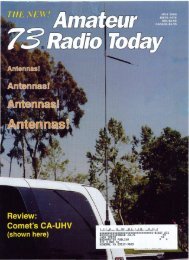rf - Free and Open Source Software
rf - Free and Open Source Software
rf - Free and Open Source Software
- No tags were found...
You also want an ePaper? Increase the reach of your titles
YUMPU automatically turns print PDFs into web optimized ePapers that Google loves.
Getting Your Extra<br />
Class License<br />
Part IV-Radio TVcLl,)es<br />
The whole purpose of radio is to communicate,<br />
<strong>and</strong> to do so requires that information<br />
be transmitted from one place to be<br />
received elsewhere. The difference between<br />
radio <strong>and</strong> other forms of communication is<br />
•<br />
that, in radio, we transmit this information<br />
over "radio waves" rather than by means of<br />
wires or the printed page.<br />
To use radio for communication we must<br />
have some knowledge of the way in which<br />
radio waves work, <strong>and</strong> so the Extra Class<br />
license<br />
examination includes a number of<br />
questions to test your knowledge of radio<br />
wave propagation.<br />
In fact, it includes too many such questions<br />
to cover adequately in a single installment<br />
of this series. This month we'll look at<br />
the general principles involved, <strong>and</strong> some of<br />
the more unusual aspects of VHF propagation.<br />
We'll h<strong>and</strong>le the following questions<br />
from the FCC study list :<br />
48. How do the directivity of an unterminated<br />
"V" antenna <strong>and</strong> a parasitic<br />
beam antenna compare?<br />
58. What are aurora-reflected VHF signals?<br />
If such a signal is heard, what<br />
does it sound like?<br />
67. What constitutes a parasitic an tenna<br />
element?<br />
71 . List some different types of beam<br />
antennas.<br />
76. What determines the skip distance of<br />
radio waves?<br />
As usual, we'll extend the scope of these<br />
questions to cover the subjects more fully.<br />
For a start, we'll examine the whole problem<br />
by asking "What Is Radio Communication?"<br />
We will find, while exploring that subject,<br />
that signals are both radiated <strong>and</strong> reflected<br />
in the process of being used to com municate.<br />
Our second <strong>and</strong> third questions will look<br />
in more detail at reflection, by asking first<br />
"How Does Signal Reflection Occur?" <strong>and</strong><br />
then "How Does Reflection Affect the<br />
Signal?". The answers to these two questions<br />
will include the unusual VHF effects, <strong>and</strong><br />
will also help us meet the final two questions.<br />
OUf final two questions will bring us into<br />
the area of signal radiation: "How Is a Signal<br />
Radiated?" will introduce the subject of<br />
antennas in general; "How Can a Signal Be<br />
Concentrated?" will focus our attention on<br />
directive antennas.<br />
While we'll get no farther in this month's<br />
instalment, future discussions will extend<br />
our study of antennas in the same direction.<br />
All set? Let's dive in.<br />
What Is Radio Communication? It may<br />
seem an overstatement of the obvious to<br />
proclaim that the whole purpose of radio is<br />
to communicate - yet many of us are so<br />
involved with the purely technical aspects of<br />
radio <strong>and</strong> electronics that we tend to lose<br />
sight of this basic fact. For this reason it's<br />
worth while to st<strong>and</strong> back at this point <strong>and</strong><br />
try to find out just what is involved in<br />
communication by radio - or "radio communication".<br />
Let's try to find out what is involved by<br />
doing some "word substitution". What we<br />
want to know is simply "What Is Radio<br />
Communication?" If we can substitute other<br />
words or phrases for the words "radio" <strong>and</strong><br />
"communication", we may have a meaningful<br />
answer.<br />
We'll tackle the hard o ne first - what can<br />
we put in the place of "communication"?<br />
This is hard because the question of what<br />
constitutes communication has been stumpin&<br />
the experts for years, <strong>and</strong> promises to<br />
continue doing so for some years to come.<br />
About all that they agree on is that communication<br />
involves a "transfer of information"<br />
- so let's try that on for size.<br />
"Radio transfer of information" still<br />
seems to make sense although it doesn't tell<br />
100<br />
73 MAGAZINE



